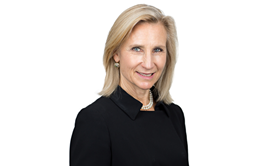Former FBI lawyer Lisa Osofksy today allayed lingering doubts about the future of the Serious Fraud Office as she delivered her first speech as director of the agency.
Offering a collegiate vision of how she plans to make the UK a ’high-risk place’ for sophisticated criminals, she also vowed to draw on solicitors’ expertise.
Osofsky, who has dual US and British nationality, affirmed that she has the attorney-general’s support to maintain the independence and prominence of the SFO over her five-year term. 'That’s the basis on which I took this job and what I expect to find throughout my tenure,’ she told the Cambridge International Symposium on Economic Crime.
This follows speculation that Osofsky may have been receptive to Theresa May’s plan to roll the SFO into a broader National Crime Agency.

Osofsky pledged to work closely with regulators, NGOs and the private sector, adding: ’I also want to utilise the legal sector’s expertise. Lawyers, solicitors and barristers have alot to offer in fighting crime and I intend to reach out to seek their input and ideas.’
She also wants to enhance the agency’s use of technology to help crack data-heavy cases. Osofsky cited the example of deploying an artificial intelligence robot to help check for privileged material in the landmark Rolls Royce case back in 2016. This led to an 80% saving in the area it was used.
’With the new eDiscovery platform we’re starting to use across all of our new cases, we’ll soon bring a range of machine learning and AI-based technology assisted review features to our investigations; these build on the success of the LPP robot,’ she added.
’This should create even greater efficiencies, and potentially help us reach charging decisions sooner, and shorten the time it takes to progress to trial. These technologies are used more commonly in civil cases, but we see them as essential, so we’re developing processes that will allow us to use them in our cases while still complying with criminal disclosure rules.’
Deferred prosecution agreements, which Osofsky said are now spreading across the globe, will also be at the core of her strategy. But where DPAs are agreed, she stressed, 'the SFO will want assurance that companies are doing everything they can to ensure the crimes of the past won’t be repeated long after the watchful eye of the prosecutor moves on to another target’.
Christopher David, counsel in WilmerHale’s UK white-collar defence team, commented: 'While much of [the speech] is familiar territory, there are some interesting new ideas, including deliberate references to the enforcement methods used by the US authorities and the suggestion that similar methods can be used in the UK. The speech is also strong on collegiality and cooperation with other law enforcement agencies and regulators – national and international – and firmly dismisses the suggestion that she has previously supported the integration of the SFO with the NCA.’
Jonathan Pickworth, partner at White & Case, said Osofsky’s comments would 'relieve any nagging doubts’ about the future of the SFO and enable the agency to focus on the biggest and most complex cases.



























2 Readers' comments